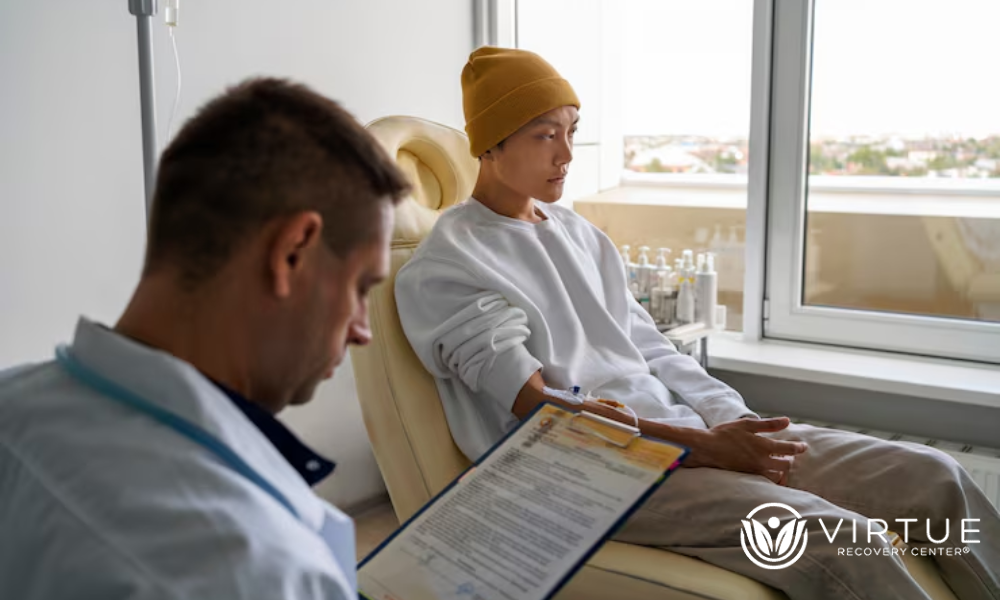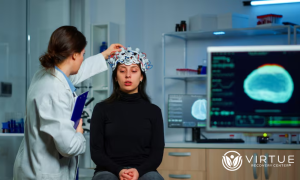Key Takeaways
- Fentanyl is far more potent than other opioids, which makes overdoses much more prevalent and severe.
- Austin’s comprehensive opioid therapy deals with both physical addiction and mental damage.
- Trauma treatment programs in Killeen help people deal with the emotional suffering that comes with using drugs.
- Fentanyl test strips are a harm reduction tool that can save lives for those who are at risk.
- Timely action may dramatically lower the number of overdose fatalities and enhance recovery results.
Introduction
The fentanyl overdose epidemic has struck Texas hard, and Austin is no exception. Fentanyl-related mortality has risen at an alarming pace over the last several years, drawing the attention of public health authorities, addiction experts, and community leaders. Fentanyl is up to 50 times stronger than heroin and 100 times stronger than morphine. This means that even little doses may kill you.
Opioid treatment in Austin is now a key part of saving lives. It does this not just via detox and medicine, but also by dealing with trauma, mental health issues, and ways to avoid relapse. Research from the National Institute on Drug Abuse highlights the importance of expanding access to evidence-based medications like methadone. As fentanyl test strips become easier to get, harm reduction measures are also becoming more popular as part of a whole response.
Why Is Fentanyl Causing a Rise in Overdoses in Austin?
One reason for the surge in fentanyl overdoses is that it is easy to find fake pills and drugs that have been cut with other drugs. Most folks aren’t even aware they’re using fentanyl until it’s too late. Because the drug is so potent, even a tiny mistake in how much to take might cause breathing problems and death.
The speed at which fentanyl works is another consideration. Symptoms of an overdose, such as slowed breathing and loss of consciousness, may happen in only a few minutes. This limited time frame makes quick action extremely important, which is why Austin treatment centers are stressing both emergency medical care and long-term rehabilitation plans.
How Austin’s Opioid Treatment Helps Those Who Are Addicted to Fentanyl

Detox is just one part of good opioid treatment in Austin. Providers usually use a multi-pronged approach:
- Medical detoxification is the safe way to deal with withdrawal symptoms in a medical setting that is monitored. During this stage, the patient may be given drugs like buprenorphine or methadone to help them stop wanting drugs and become stable.
- Medication-Assisted Treatment (MAT) is the ongoing use of FDA-approved drugs to help with long-term recovery, while counseling deals with the mental component of addiction.
- Behavioral therapies, such as cognitive behavioral therapy (CBT), dialectical behavior therapy (DBT), and other evidence-based treatments, assist people in transforming problematic ways of thinking and dealing with stress.
- Planning to avoid relapse involves identifying its causes, building a solid support network, and establishing good habits.
A review published in the NIH’s PubMed Central notes that MAT combined with behavioral therapy remains one of the most effective strategies for fentanyl addiction recovery. Austin treatment clinics are better prepared to deal with the fentanyl epidemic head-on by combining these parts.
What Trauma Therapy Programs Do in Killeen
For a lot of people, opioid addiction is linked to trauma that hasn’t been dealt with. People may turn to drugs or alcohol as a means to cope with abuse, neglect, bereavement, or seeing violence. The trauma therapy program in Killeen focuses on these deep-seated emotional problems, which are necessary for long-term recovery. Trauma treatment usually includes:
- Somatic Experiencing looks at how trauma is stored in the body.
- Group therapy helps people connect and feel less alone.
These programs help people create better coping strategies by dealing with the trauma that caused their addiction. This lowers the chance of relapse following opioid rehab.
Fentanyl Test Strips as a Useful Harm Reduction Tool
The objective is to get people into treatment programs, but harm reduction measures save lives in the meantime. Fentanyl test strips let people screen drugs for fentanyl before they consume them. This little step may help individuals make wise decisions, avoid deadly dosages, and finally get assistance when they are ready.
Austin’s public health agencies are distributing more test strips via local organizations, clinics, and harm reduction outreach programs. Critics say that harm reduction “enables” drug use, but studies indicate that it lowers overdose fatalities and encourages users to seek addiction treatment.
The Next Step in Fentanyl Addiction Treatment

To get over a fentanyl addiction, you need dedication, patience, and comprehensive support. Fentanyl addiction rehab facilities provide controlled environments where people can work on physical healing, emotional recovery, and rebuilding their lives. A typical fentanyl treatment plan can include:
- Detox and stabilization with medical monitoring around the clock.
- Individual therapy to address personal triggers.
- Family therapy to repair damaged relationships.
- Life skills training for independent living after treatment.
These programs offer safety and guidance to overcome one of the most dangerous opioids in existence.
Dealing With the Emotional Effects of the Fentanyl Crisis
The fentanyl crisis doesn’t simply affect those who are addicted; it impacts families, friends, and entire communities. Loved ones often experience fear, anger, sadness, and helplessness.
Family support groups in Austin and Killeen educate members about addiction, healthy communication, and setting boundaries. These groups also provide an outlet for coping with the pain of watching someone struggle with substance abuse.
Conclusion
The rise in fentanyl overdoses in Austin is a wake-up call for swift, united action. People at risk can get help from opioid treatment in Austin and trauma therapy programs in Killeen. Communities may save lives and strive toward long-term recovery by using harm reduction tools like fentanyl test strips.
Virtue Recovery Center, Killeen, can help if you or someone you care about is addicted to fentanyl or opioids. Our compassionate team provides evidence-based rehab programs tailored to each person’s needs. To begin your recovery journey, call us at 866-843-0545 today.
FAQs
What makes fentanyl more harmful than other opioids?
Because fentanyl is so potent, it is easier to overdose accidentally. It may be deadly even in small amounts, and it commonly contaminates other drugs without the user knowing.
What part does trauma treatment have in getting over an opioid addiction?
Trauma therapy helps heal emotional wounds that may lead to drug use, increasing the chances of long-term sobriety.
What is the process behind fentanyl test strips?
They detect fentanyl in a drug sample, helping people avoid accidental overdoses.
Is it possible for me to start treatment in Austin and then complete it in Killeen?
Yes. Many treatment networks coordinate to make the transition from detox to ongoing therapy smoother.
Is it safe to use medicine to help with treatment?
Yes. MAT is a safe and effective method for reducing cravings and preventing relapse when monitored by medical professionals.
Resources:
- Centers for Disease Control and Prevention. Preventing Opioid Overdose. CDC, 9 June 2025, https://www.cdc.gov/overdose-prevention/prevention/index.html.
- U.S. National Institute on Drug Abuse. “To Address the Fentanyl Crisis, Greater Access to Methadone Is Needed.” NIDA, 29 July 2024, https://nida.nih.gov/about-nida/noras-blog/2024/07/to-address-the-fentanyl-crisis-greater-access-to-methadone-is-needed.
- NIH PMC. “Managing Opioid Withdrawal Symptoms During the Fentanyl Crisis: A Review.” PMC, U.S. National Institutes of Health, https://pmc.ncbi.nlm.nih.gov/articles/PMC11016949/.
- About the Author
- Latest Posts
Gigi Price holds licenses as a Master Social Worker and Clinical Drug Counselor. She completed her master’s degree in Social Work at Texas State University. Over the last decade, Gigi has been dedicated to utilizing evidence-based practices to enhance patient care and treatment planning, resulting in positive, long-term outcomes for patients and their families. Her passion lies in creating a treatment environment where professionals collaborate to bring about positive change and provide a safe, trustworthy therapeutic experience. Patients can be confident in receiving top-quality care under her leadership.
In her role as the Clinical Director of Virtue Recovery Houston, Gigi conducted research to identify the most effective approaches for treating patients with acute mental health diagnoses, PTSD, and Substance Use Disorder. She then assembled a team of skilled clinicians who could offer various therapeutic modalities, such as Cognitive Behavioral Therapy (CBT), Dialectical Behavioral Therapy
(DBT), Acceptance and Commitment Therapy (ACT), Somatic Exposure, Eye Movement Desensitization and Reprocessing (EMDR), and Cognitive Processing Therapy (CPT). Gigi takes pride in overseeing the development and implementation of Virtue Houston’s Treatment Program, which includes two specialized therapeutic curricula tailored to the unique needs of individuals struggling with mental health issues, addiction, and PTSD.









